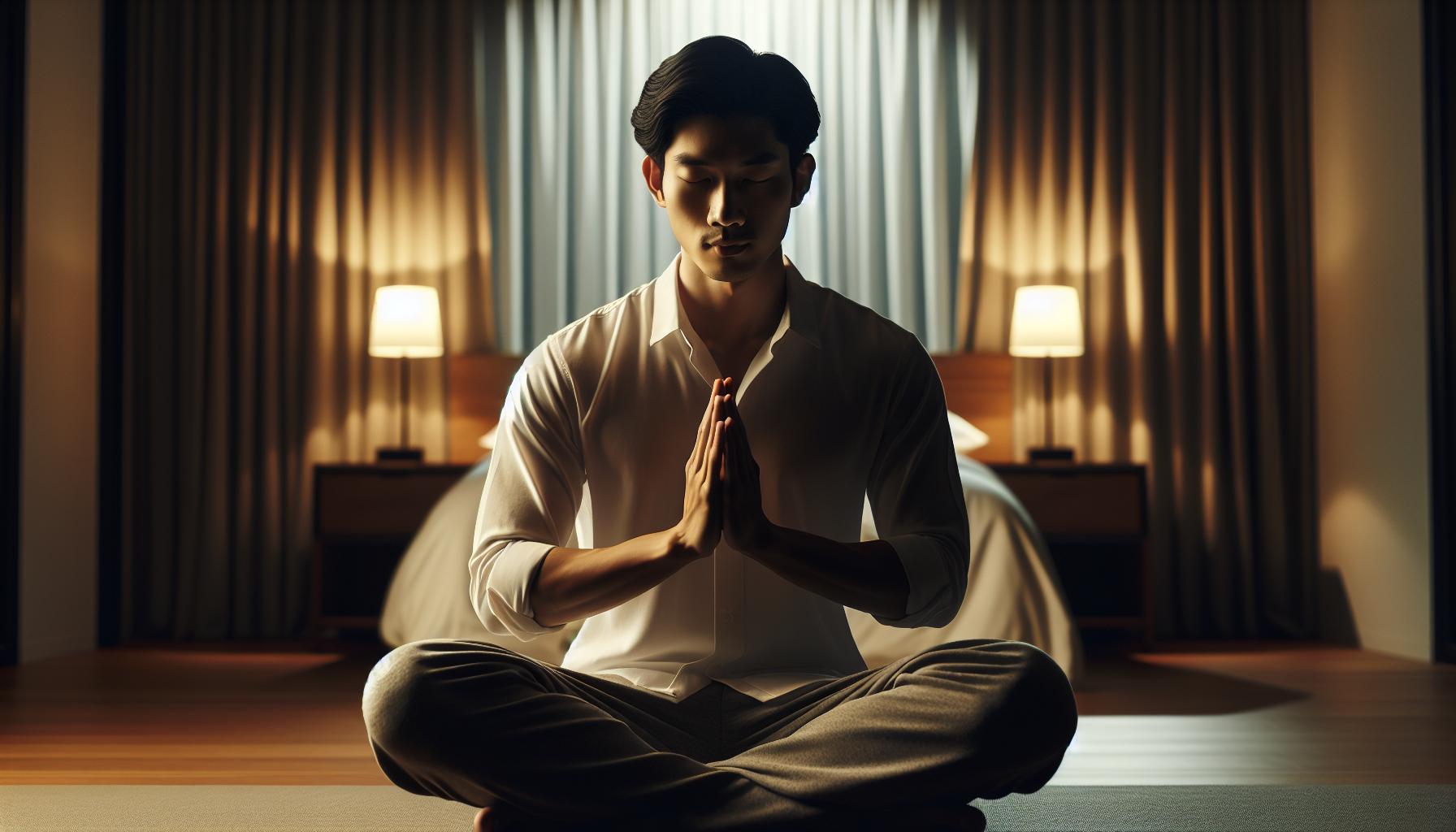Buddhist Mantra Sleep Guide: Serene Nights Ahead
Struggling to find peace in your nightly routine? Buddhist mantras for sleep might be the serene solution you’ve been searching for. These ancient chants are more than just sounds; they’re tools that can transform your bedtime into a tranquil escape.
Imagine ending your day enveloped in a soothing mantra, each syllable melting away the stress and chaos. It’s not just a practice; it’s an experience that invites calmness into your life, paving the way for restorative slumber.
Incorporating Buddhist mantras into your sleep ritual could be the key to unlocking deeper relaxation and a more mindful state as you drift off. Ready to dive into the serene world of mantras? Let’s explore how these powerful phrases can help you achieve the restful night’s sleep you deserve.
What are Buddhist Mantras?
Imagine a tool so powerful, it can change the very rhythm of your heart and mind as you prepare for sleep. Buddhist mantras are precisely that. Rooted in ancient practices, they consist of specific words and sounds that have been chanted for centuries as a way to promote healing, peace, and spiritual growth.
When you vocalize these mantras, you aren’t just reciting words; you’re engaging in a form of meditation. The rhythmic repetition has a hypnotic effect, leading your mind away from daily worries and into a state of deep calm. They’re not specific to any one language; in fact, Sanskrit – the language most of these mantras are in – isn’t used conversationally anymore. Its purpose in this context is not about the literal meaning but rather the vibrational quality of the sounds.
Here’s what might surprise you: you don’t necessarily have to be a Buddhist to reap the benefits of these soothing chants. People from all walks of life find comfort in Buddhist mantras because the practice focuses on the universal experience of seeking tranquility. It’s an inclusive tool, designed for anyone who wishes to quiet their mind and find a moment of respite from the rest of the world.
Benefits of Integration Into Sleep Routines
Why specifically use these mantras to improve sleep? It turns out, integrating them into your nightly routine can:
- Reduce stress and anxiety
- Lower your heart rate and blood pressure
- Enhance your overall quality of sleep
- Cultivate a deeper sense of self-awareness and mindfulness
Every chant serves a purpose, whether it’s to invoke a benevolent energy or simply to center your thoughts. While some mantras aim to honor a specific aspect of Buddhist philosophy, others might be focused solely on helping you release tension.
Starting with just a few minutes a night, you can gradually increase the time you spend chanting until it becomes a seamless aspect of your evening. By integrating Buddhist mantras into your bedtime routine, you’re setting the stage for a restorative sleep experience where peace is the guest of honor.
Benefits of Buddhist Mantras for Sleep

When you’re seeking an effective way to unwind and slip into a restful night’s sleep, Buddhist mantras could be a golden key. Repetitive chanting not only calms your mind but also sets the stage for a deep, uninterrupted sleep.
Physical Relaxation
Chanting activates your parasympathetic nervous system. This is the part of your body that tells you it’s okay to relax and slow down. As you chant, your breathing deepens, your heart rate drops, and your muscles relax.
Mental Clarity
The cyclical nature of mantras helps sweep away the mental clutter that often keeps you tossing and turning. They work like a mental broom, clearing out the day’s stress and leaving behind a sense of inner peace.
Emotional Balance
The soothing sounds of Buddhist mantras resonate with emotional centers in your brain, helping to dissipate feelings of anxiety or sadness. You’ll find that your usual worries might not feel so heavy after a session of mindful chanting.
Improved Sleep Patterns
Incorporating mantras into your bedtime ritual can lead to better sleep quality. As you continue to practice, you may notice a shift in your sleep patterns, leading to more restful nights and energized mornings.
Accessibility for All
You don’t need to follow a Buddhist path to reap the rewards. Mantras are universally accessible, so regardless of your background, they’re available for you to use. Start with simple chants and notice the impact they have on your nightly routine.
Bullet points to remember:
- Chanting mantras engages the relaxation response
- It provides mental and emotional balance
- No expertise or belief in Buddhism is required to benefit
By incorporating these mantras into your sleep routine, you’ll likely find yourself drifting off easier and waking up feeling more refreshed. Keep in mind, the consistent practice is key. With regular chanting, you’ll foster not only better sleep but also a greater sense of overall well-being.
How to Incorporate Buddhist Mantras into Your Sleep Routine

Adopting Buddhist mantras into your nightly ritual can be simpler than you might think. To weave these peaceful chants into your sleep routine, start an hour before bedtime. This approach signals to your body that it’s time to wind down.
Consider the ambiance of your room. Soft, dim lighting or candles can set the stage for tranquility. You’d want to make sure that your bedroom is a haven for rest: tidy, cool, and calming. An essential oil diffuser with lavender or chamomile can add an extra layer of relaxation.
Choose a mantra that resonates with you. “Om Mani Padme Hum”, meaning “the jewel is in the lotus”, or “Om Shanti”, for peace, are both popular options. Enunciate each syllable slowly, and pair the mantra with your breath—deep inhales and exhales.
Sit or lie in a comfortable position, close your eyes, and begin to chant softly. As you repeat the mantra, let any distractions fade away and allow your mind to focus solely on the sounds and vibrations. The rhythm will slowly lull your thoughts and prepare your mind and body for sleep.
Integrate gentle yoga poses or stretching before you nestle into bed to enhance your physical ease. Postures like child’s pose or legs-up-the-wall encourage circulation and further physical release.
Lastly, if you’re just starting out, keep your mantra practice short. Five minutes is an excellent beginning. Gradually increase the duration as you become more accustomed to the practice. Remember, there’s no rush—let the mantra guide you into a peaceful state at your own pace.
By following these steps, you’ll embed Buddhist mantras into your nightly routine as naturally as brushing your teeth or setting your alarm. With consistency, your sleep may become more restorative, and over time, you might even experience a profound sense of serenity throughout your night.
Popular Buddhist Mantras for Sleep

When you’re winding down for the evening, calming your mind is key to a good night’s rest. Buddhist mantras can serve as a powerful tool to help you transition into a peaceful state. Let’s take a peek at some of the most beloved mantras that are known for promoting restorative sleep.
Om Mani Padme Hum, one of the most well-known Tibetan Buddhist mantras, means “the jewel is in the lotus.” It’s believed to invoke compassionate energy and a calming presence, making it perfect for relaxation before bed. As you chant this mantra, feel the day’s stresses dissolve, leaving you in a tranquil space for sleep.
Next, the Shanti Mantra is all about peace. It literally translates to “peace mantra,” and it’s used to ask for peace in body, speech, and mind. Chanting this mantra softly can help soothe your thoughts and invite a sense of wholeness and well-being.
For a mantra that’s simple yet profound, consider Om Shanti Om. It’s an easy chant that even beginners can remember and use. The repetition of “Om Shanti” works like a lullaby for your brain, coaxing you into deeper levels of peace as you prepare to doze off.
The Medicine Buddha Mantra, which calls upon the healing energies of the Medicine Buddha, not only aims to heal the body but also to clear the mind of worry that might hinder sleep. It’s ideal for those nights when you just can’t seem to let go of anxious thoughts.
Here’s a brief list of these mantras for easy reference:
- Om Mani Padme Hum
- Shanti Mantra
- Om Shanti Om
- The Medicine Buddha Mantra
Integrating these mantras into your nightly routine can enrich your sleep experience. Start with whichever mantra speaks to you and let your mind embrace its soothing vibes. Remember to chant gently and allow the rhythm to carry you closer to a state of restful sleep. Keep practicing and adjust as needed to find the best fit for your sleep practice.
Tips for Practicing Buddhist Mantras for Sleep

When incorporating mantras into your sleep routine, consider the environment in which you’ll chant them. A calm and serene setting can significantly impact your ability to relax and dive into the practice. Think dim lights, soft bedding, and a comfortable sitting or lying position. You want to feel at ease as you repeat the mantras, allowing their rhythm to lull you into a peaceful state.
Your mindset is as important as your physical space. Approach your mantra practice with an open heart and mind, ready to receive the soothing effects. If your thoughts start to wander or crowd your consciousness, gently guide them back to the sounds and vibrations of your chosen mantra. Remember, this isn’t about perfection but about finding a harmonious path to rest.
The repetition of mantras works best when you’re not rushed. Therefore, it’s recommended to start your practice at least 30 minutes before bedtime. This buffer gives you ample time to wind down without feeling hurried. If you’re new to this routine, start with a concise mantra, and gradually increase the duration as you get more comfortable.
Here’s a simple framework you might follow for a nightly mantra meditation:
- Begin by sitting or lying in a comfy spot.
- Close your eyes and take several deep breaths to settle in.
- Start chanting your chosen mantra softly and slowly.
- Optional: Use mala beads to keep track of repetitions.
- Continue for 10 to 20 minutes, depending on what feels right for you.
Remember, consistency is key. Make a commitment to practice nightly, and you’ll likely notice improvements in your sleep quality. Allow yourself to be flexible with the process and adjust as you go, this is your personal journey to better sleep with Buddhist mantras.
Conclusion
Embracing Buddhist mantras as part of your nightly ritual can be a transformative experience. With the right environment and a dedicated mindset, you’ll find the peace and relaxation necessary for a restful sleep. Remember it’s not about how long you chant but the quality of your focus and intention. Stay consistent with your practice and don’t hesitate to adjust the duration to what feels right for you. Let the mantras guide you into deeper tranquility and awaken refreshed each morning, ready to embrace the day with renewed energy and calmness.







